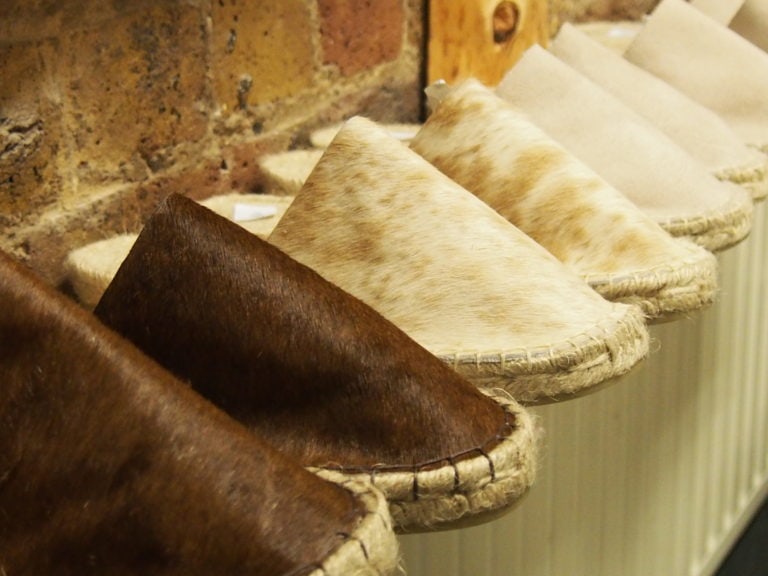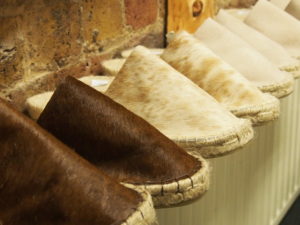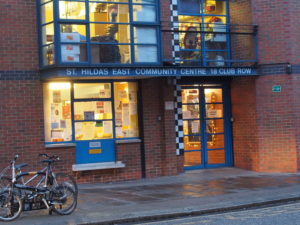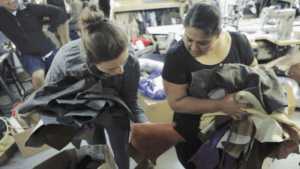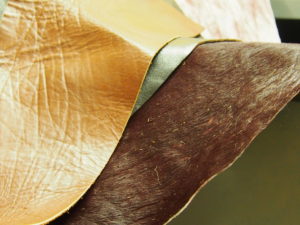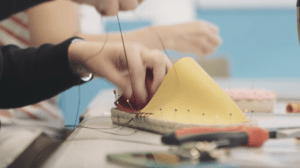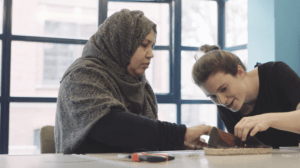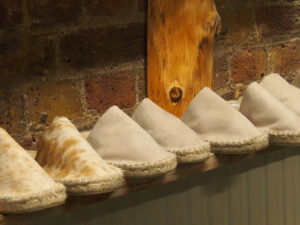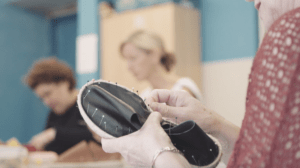Juta Shoes is a community development enterprise born out of St. Hilda’s East Community Center (St. Hilda’s) in East London. The handmade espadrilles are made by women who are socially isolated and face several barriers to work. We were intrigued to learn more about this enterprising grassroots community organization in the heart of London and met with founders Joanna Hamer and Sabeha Miah to learn more.
The Community – Why Employment Matters
Located in one of the oldest and most diverse boroughs and municipal estates in London, St. Hilda’s offers a variety of services and resources for the community including for children and adults alike. These services include: legal advice; employment preparation services (for both young adults and adults); a creche; fitness programs; free ESOL classes; IT courses and; a women’s club. It is a vibrant community that has seen waves of immigrants through the decades and more recently has undergone gentrification, making life for the working-class community, even more difficult. It is home to some of the most wealthiest and affluent communities as well as to some of the most deprived.
Gaining long term employment is often a struggle for those that belong to the working class community, particularly women within the immigrant population, who are often socially isolated due to language and/or cultural barriers. While many have basic skills in sewing and making craft products, this doesn’t translate to a sustainable source of income.
Generating a livelihood through Juta Shoes
Founders Joanna Hammer and Sabeha Miah met whilst each was working on their respective degrees in social enterprise. Introduced by a common mentor, the two women developed the idea of making handmade leather espadrilles with jute soles. Joanna, a keen crafter who loves making handmade products, developed a simple pattern for the shoes that could be made by women, no matter their skill level. Sabeha, who runs the Boundary Women’s project at the community center, used her family connections within the leather industry (both leather and garment factories are indigenous to the neighbourhood) to access good quality leather and calf-skin cast offs from the factories. Not only does this save on the cost of raw materials, but it saves costs for the factories too, who would normally have to pay to get rid of their waste products.
What is unique about Juta Shoes production process is that once the women have been trained and the standard of quality have been ensured, they can then take the materials and make the shoes at home. This enables the women to work at a pace and timeline that is convenient to their family life, while earning a stable source of income. (Each pair of shoes can be produced in approximately two hours). In addition to gaining these production skills, the women also learn business skills through producing invoices and accounting for their time. This process and approach also enables the women to gain the necessary skills required of job-seekers within the UK welfare system.
The Enterprise
Juta shoes currently has six proficient producers who have been focussed on production. As the enterprise grows, recruiting and training enough proficient producers will be a challenge. Joanna and Sabeha are keen to find different roles for these women regardless of level of skill and training and are looking to develop opportunities outside of shoe production, in packaging, logistics and accounting. They also plan to develop roles for the women in supervisory capacity over production.
Towards the end of 2016, Juta Shoes launched a successful Kickstarter campaign where they met their goal to produce their inaugural collection of shoes, during the first two days of the campaign! http://www.jutashoes.com/kickstarter.html
As they look to the year ahead, Joanna and Sabeha have plans to expand their product line to include sandals as well as creating their own shoe bags. They also hope to offer classes where members from the public can come and how to learn to make a pair of their own shoes from the Juta Shoes producers.
Social Impact
At the core of this enterprise is the focus on providing marginalized women a means by which they can have a sustainable livelihood. One of the factors that contribute to this is the steady growth of production and ensuring that profit margins allow for fair wages. Juta Shoes is committed to paying their producers a fair wage above the London Living Wage and in order to do so founders Joanna and Sabeha are currently exploring ways in which to grow their production and output including small batch production opportunities throughout the country.
Juta Shoes also has an impact in the local community in which it resides. Many small business in the vicinity, including the local branch of supermarket chain Sainsbury’s have been very supportive of the community center and the Boundary Women’s project and selected them as their charity of the year. It is hoped they continue to develop ties with local businesses who are interested in investing in the local community.
The enterprise has also provided an opportunity for the two parallel communities that reside in the larger neighbourhood, to interact. As word of Juta Shoes has spread, many of the middle class population have expressed an interest in learning more about the community center and how they support its activities.
We look forward to following and sharing Juta Shoes success in the years to come and are encouraged by the role community development and income generation plays in the urban environment too.
For more information about Juta Shoes visit: http://www.jutashoes.com/

